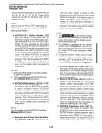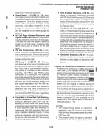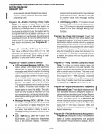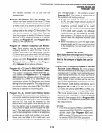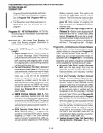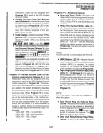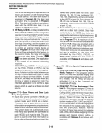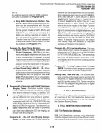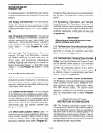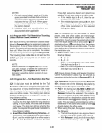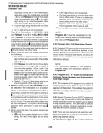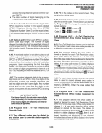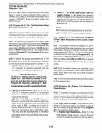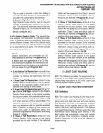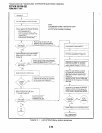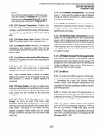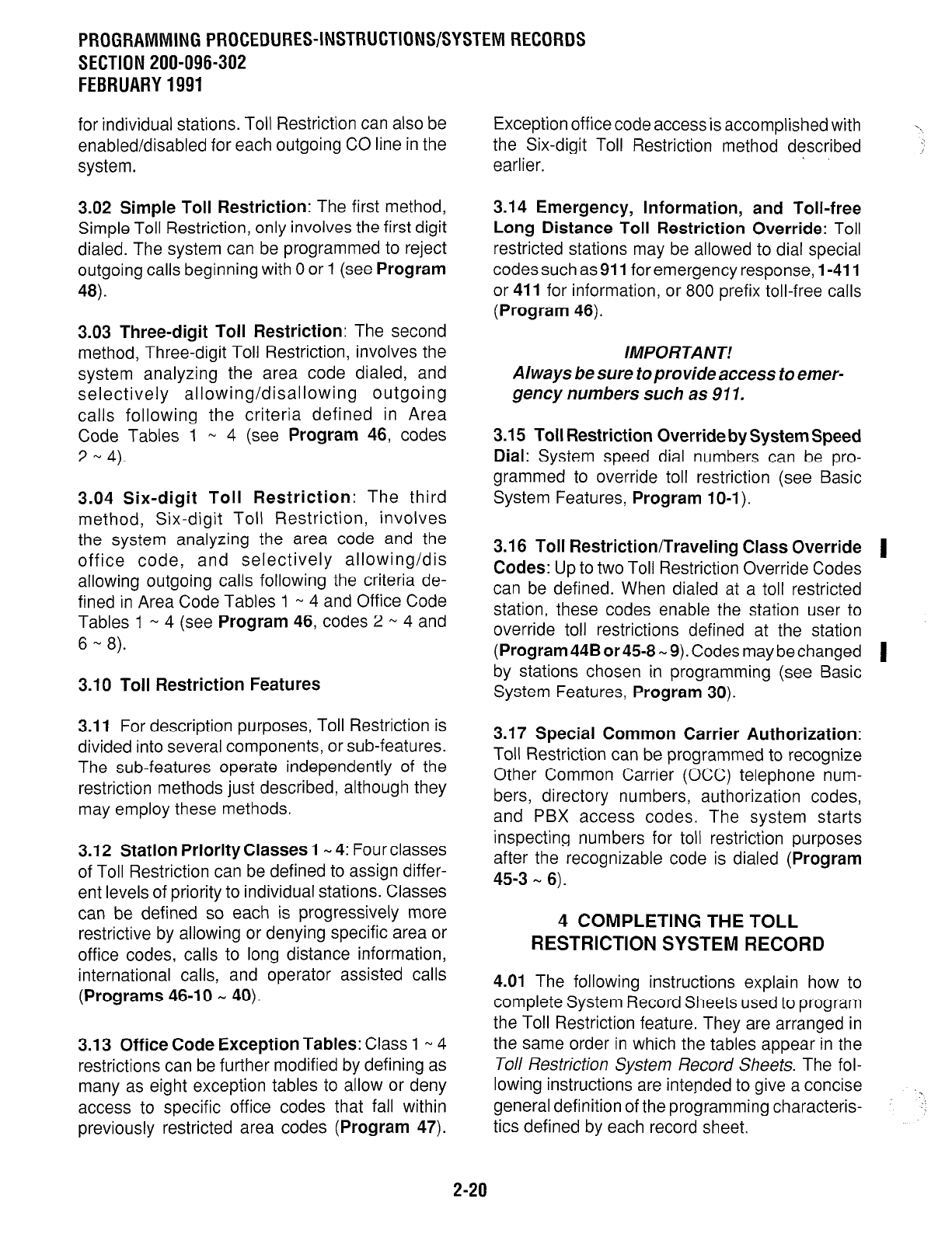
PRDGRAMMlNG PROCEDURES-INSTRUCTIONS/SYSTEM RECORDS
SECTION 200-096-302
FEBRUARY 1991
for individual stations. Toll Restriction can also be
enabled/disabled for each outgoing CO line in the
system.
Exception office code access is accomplished with
the Six-digit Toll Restriction method described
earlier.
.
3.02 Simple Toll Restriction:
The first method,
Simple Toll Restriction, only involves the first digit
dialed. The system can be programmed to reject
outgoing calls beginning with
0
or 1 (see
Program
48).
3.14 Emergency, Information, and Toll-free
Long Distance Toll Restriction Override:
Toll
restricted stations may be allowed to dial special
codes such as
911
for emergency response,
l-41 1
or
411
for information, or 800 prefix toll-free calls
(Program 46).
3.03 Three-digit Toll Restriction:
The second
method, Three-digit Toll Restriction, involves the
system analyzing the area code dialed, and
selectively allowing/disallowing outgoing
calls following the criteria defined in Area
Code Tables 1
- 4 (see Program 46,
codes
2 - 4).
IMPORTANT!
Always be sure to provide access to emer-
gency numbers such as 911.
3.04 Six-digit Toll Restriction:
The third
method, Six-digit Toll Restriction, involves
the system analyzing the area code and the
office code, and selectively allowing/dis
allowing outgoing calls following the criteria de-
fined in Area Code Tables 1 - 4 and Office Code
Tables
1 - 4 (see Program
46, codes 2 - 4 and
6 - 8).
3.15 Toll Restriction Override by System Speed
Dial:
System speed dial numbers can be pro-
grammed to override toll restriction (see Basic
System Features,
Program IO-I).
3.10 Toll Restriction Features
3.16 Toll Restriction/Traveling Class Override
1
Codes:
Up to two Toll Restriction Override Codes
can be defined. When dialed at a toll restricted
station, these codes enable the station user to
override toll restrictions defined at the station
(Program44Bor458-9).Codesmaybechanged 1
by stations chosen in programming (see Basic
System Features,
Program 30).
3.11
For description purposes, Toll Restriction is
divided into several components, or sub-features.
The sub-features operate independently of the
restriction methods just described, although they
may employ these methods.
3.12 Station Priority Classes 1
-. 4: Four classes
of Toll Restriction can be defined to assign differ-
ent levels of priority to individual stations. Classes
can be defined so each is progressively more
restrictive by allowing or denying specific area or
office codes, calls to long distance information,
international calls, and operator assisted calls
(Programs 46-10 - 40).
3.17 Special Common Carrier Authorization:
Toll Restriction can be programmed to recognize
Other Common Carrier (OCC) telephone num-
bers, directory numbers, authorization codes,
and PBX access codes. The system starts
inspecting numbers for toll restriction purposes
after the recognizable code is dialed
(Program
45-3 - 6).
4 COMPLETING THE TOLL
RESTRICTION SYSTEM RECORD
3.13 Office Code Exception Tables:
Class 1 - 4
restrictions can be further modified by defining as
many as eight exception tables to allow or deny
access to specific office codes that fall within
previously restricted area codes
(Program 47).
4.01 The following instructions explain how to
complete System Record Sheets used to program
the Toll Restriction feature. They are arranged in
the same order in which the tables appear in the
Toll Restriction System Record Sheets. The fol-
lowing instructions are intended to give a concise
general definition of the programming characteris-
tics defined by each record sheet.
2-20
‘\
..
/
. .
:i



